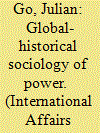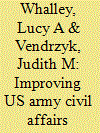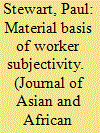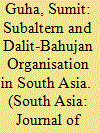|
|
|
Sort Order |
|
|
|
Items / Page
|
|
|
|
|
|
|
| Srl | Item |
| 1 |
ID:
124763


|
|
|
|
|
| Publication |
2013.
|
| Summary/Abstract |
Michael Mann's long-anticipated volumes, the sources of social power, volume 3: global empires and revolution, 1890-1945 and the sources of social power, volume 4: globalizations, 1945-2011 complete Mann's career-spanning project. Compared to previous volumes in the series, these works are much more global in scope. They address topics such as global wars, empires, social citizenship across the industrialized world, economic recessions and climate change. In this way they rectify omissions in Mann's previous work, even while continuing to deploy Mann's previous IEMP (ideological, economic, social, political) model of power. However, three shortcomings remain: first, the books do not adequately deploy the concept of society as power networks; second, they do not offer a conceptualization of global systems or dynamics beyond the sum total of actions by individual states or actors; and third, they retain the standpoint of power in their analyses. Despite these shortcomings, these volumes offer a masterful global history of power over the past century and a half and make long-lasting contributions to the historical sociology of power.
|
|
|
|
|
|
|
|
|
|
|
|
|
|
|
|
| 2 |
ID:
173847


|
|
|
|
|
| Summary/Abstract |
Soldiers with operational experience in Afghanistan or Iraq have offered numerous critiques of the US Army Civil Affairs doctrine on assessment of the human domain, making recommendations for its improvement. The current process uses two frameworks, commonly known by the acronyms ASCOPE and PMESII-PT, to evaluate the operational environment. Neither the current process nor the proposed improvements address social power relations. It is unlikely that civil-military operations intended to establish peace and maintain stability will be successful if they are planned and executed without an in-depth understanding of social power. We advocate incorporating social power analysis into Civil Affairs assessment.
|
|
|
|
|
|
|
|
|
|
|
|
|
|
|
|
| 3 |
ID:
144805


|
|
|
|
|
| Summary/Abstract |
This article presents an historical overview of the occupation of rock drillers in South African mines. It is argued that the critical productive role this occupation plays in the underground production process must be central to understanding why the rock drill operators (RDOs) initiated a major strike wave on South African platinum mines in 2012, what transpired at Marikana in August of that year and the 2014 industry-wide strike. Long established as an elite within the mining industry, the RDOs negotiated directly with management over the past 30 years beyond the ambit of representational politics. However, the migrant labour status, deplorable living conditions and memories of past struggles intersect with the impact of their working conditions underground. This article suggests that the historically identifiable objective location of these workers in production serves as the material basis for their political subjectivity.
|
|
|
|
|
|
|
|
|
|
|
|
|
|
|
|
| 4 |
ID:
137745


|
|
|
|
|
| Summary/Abstract |
The fourth volume of Michael Mann’s The Sources of Social Power is the last in his historical sociological series, which has centred on an analysis of ideological, economic, military and political power in human societies from the start of civilisation. Mann’s final volume provides an important overview of the period of American hegemony and its worldwide effects, the rise and crisis of neoliberalism, the contrasting fates of the USSR and Maoist China, the vagaries of American empire, and modern revolutions. The implications of his study, particularly regarding the history and theory of revolutions, are of the utmost value to anyone on the Revolutionary Left today, especially in the Third World. While Mann’s study is primarily focused on the West, it provides important lessons to be drawn for the Third World.
|
|
|
|
|
|
|
|
|
|
|
|
|
|
|
|
| 5 |
ID:
188185


|
|
|
|
|
| Summary/Abstract |
This article analyses the history of Marathi-speaking India after 1600 in order to understand why Dalit and Bahujan movements first arose in this region before spreading across South Asia. It argues that this was an explicable consequence of a tradition of social action long extant at the village and supra-village levels—that self-organisation had been yoked to hegemonic power, but not thereby erased. I then invoke Antonio Gramsci’s concept of subalterns as subordinated fractions of a larger whole to analyse this phenomenon. Finally, I trace the breaks and continuities that enabled the leadership of Jyotirao Phule and B.R. Ambedkar.
|
|
|
|
|
|
|
|
|
|
|
|
|
|
|
|
|
|
|
|
|